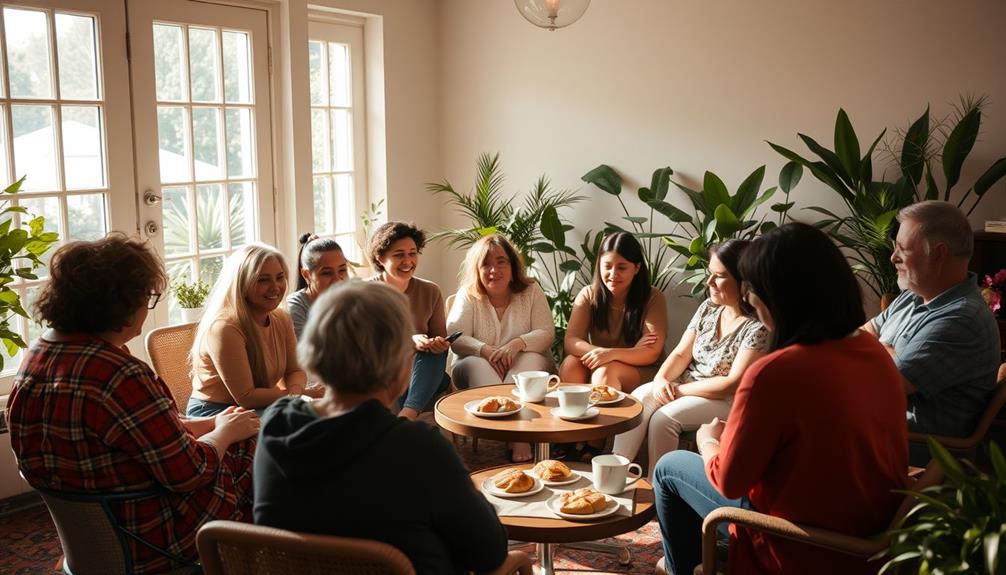Support groups play an essential role in dementia and Parkinson's care by offering emotional support and practical resources. You'll find that these groups help reduce feelings of isolation, enhancing your mental well-being through shared experiences. They provide a sense of community and improve caregiving skills with insights from others facing similar challenges. Whether you choose general support or specialized groups, each offers unique advantages. Many also link you to local resources and online options for more flexibility. If you explore further, you might discover different types of groups and how they can specifically cater to your needs.
Key Takeaways
- Support groups provide emotional support for caregivers and patients, reducing feelings of isolation and enhancing mental well-being.
- They foster community connections, improving caregiver resilience and coping strategies through shared experiences and resources.
- Specialized groups address unique challenges faced by caregivers of individuals with dementia and Parkinson's, such as younger-onset issues.
- Resource sharing within these groups offers insights on caregiving techniques, financial considerations, and local service options.
- Online support groups expand access to global networks, allowing for flexible participation and expert-led discussions on caregiving.
Importance of Support Groups

Support groups play an essential role in the lives of those affected by dementia and Parkinson's disease. They provide a confidential environment where caregivers and patients can share their experiences, fostering emotional support and understanding.
By connecting with others facing similar challenges, you can enhance your mental health and overall well-being. These groups also highlight the importance of key domains of development in psychology, emphasizing how emotional and psychological growth is vital not only for patients but also for caregivers managing their roles.
Participants often report reduced stress levels and improved coping strategies, thanks to the shared resources and insights gained within these groups. This connection is critical for managing daily difficulties.
Research shows that being part of a support group leads to better mental health outcomes, including increased social connectedness and an improved quality of life.
Specialized support groups also cater to unique demographics, such as younger-onset caregivers, ensuring that everyone's specific needs are addressed effectively.
Whether you choose to access local or online support groups, you'll find a community that reduces feelings of isolation and promotes a sense of belonging.
Embracing these opportunities can greatly impact your journey, allowing you to maneuver the complexities of dementia and Parkinson's care with greater resilience and support. By tapping into available resources and seeking guidance from healthcare professionals, caregivers can foster a more compassionate and effective approach. Additionally, connecting with support groups provides emotional sustenance, allowing one to navigate the often overwhelming responsibilities of caring for individuals with Parkinson’s disease and dementia. Together, these strategies not only improve caregiving skills but also enhance the overall quality of life for both patients and their loved ones.
Benefits for Caregivers and Patients
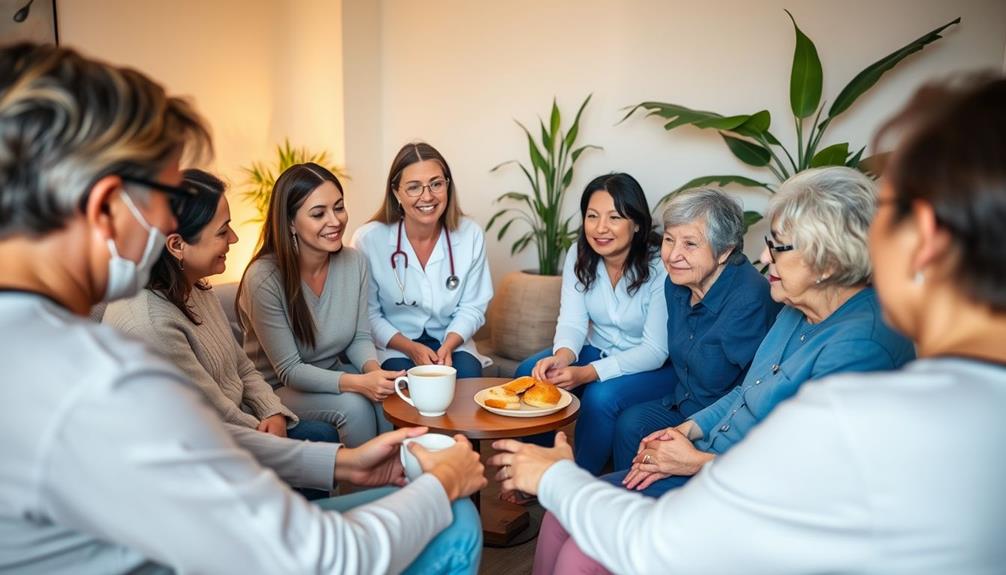
Support groups offer you an essential source of emotional support, helping you feel less isolated as you connect with others facing similar challenges.
This sense of community can be particularly important for caregivers, as they often experience chronic feelings of emptiness and emotional dysregulation, similar to those found in individuals with Borderline Personality Disorder.
By sharing resources and coping strategies, you can enhance your caregiving skills and better manage daily obstacles.
This collaborative environment not only benefits you but also positively impacts the well-being of the individuals you care for.
Emotional Support Mechanisms
How can caregivers and patients facing dementia or Parkinson's disease find the emotional strength to navigate their daily challenges? One effective way is through participation in caregiver support groups.
These groups create a safe space for sharing experiences and foster a sense of community. When you connect with others dealing with similar issues, you gain valuable emotional support and reduce feelings of isolation.
Moreover, engaging in these groups can enhance creativity and lead to innovative solutions for managing daily tasks, as the power of imagination plays an essential role in overcoming challenges.
Here are some benefits of engaging in support groups:
- Peer Support: Sharing stories with others who understand your struggles can enhance emotional resilience.
- Coping Strategies: Learning from fellow participants helps develop effective coping strategies for managing stress and emotional burdens.
- Social Activities: Many groups organize social activities, providing an avenue to bond and alleviate anxiety while making new friends.
Research shows that the emotional support gained in these settings leads to greater satisfaction with your caregiving experience.
Resource Sharing Opportunities
Joining a caregiver or patient support group opens up valuable resource-sharing opportunities that can greatly ease the journey through dementia or Parkinson's disease. In these groups, you can connect with others who understand your challenges, making it easier to share experiences and coping strategies. This support helps alleviate feelings of isolation, creating a community that fosters resilience.
Additionally, gaining insights into financial considerations for elderly care can provide caregivers with essential information to better manage their loved ones' needs.
Resource sharing is a key benefit of these groups. You'll gain access to critical information on local services, treatment options, and educational materials that can considerably aid in managing the disease. By engaging with others, you'll learn effective caregiving techniques that can simplify your daily tasks and improve the quality of care you provide.
Moreover, the insights gained from fellow caregivers enhance your mental health, leading to a better overall quality of life for both you and the person you care for. The wisdom shared in these support groups can empower you to navigate the complexities of Parkinson's disease or dementia more effectively.
Ultimately, these resource-sharing opportunities create a supportive environment where both caregivers and patients can thrive, making the journey less intimidating and more manageable.
Types of Support Groups Available
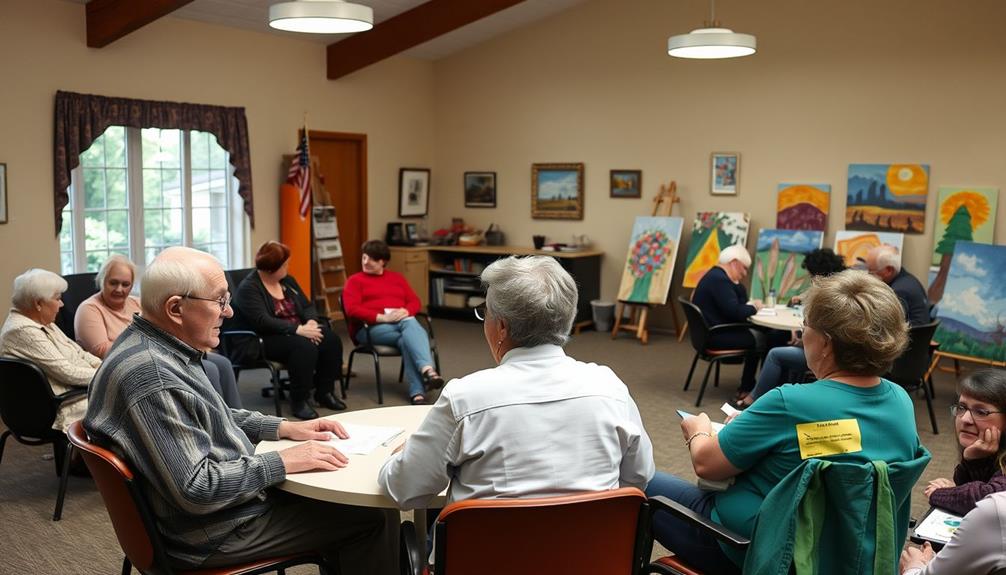
When it comes to support groups for Parkinson's disease, you'll find a variety of options tailored to your needs.
These groups not only provide a space for sharing experiences but also foster emotional connections that can be incredibly healing.
General support groups provide a space for sharing experiences, while specialized caregiver groups focus on unique challenges you might face.
No matter your situation, there's likely a group that can offer the guidance and understanding you need, including heartfelt expressions of love that can resonate deeply with caregivers and patients alike.
General Support Groups
Support groups for individuals with Parkinson's and their caregivers come in various types, each designed to address specific needs and experiences.
These general support groups provide a safe platform for sharing experiences and coping strategies, ultimately enhancing emotional well-being and social connectedness. Conducting effective support groups also requires ensuring workplace safety and compliance, similar to how employers conduct background checks to maintain trust and safety.
Here are three types of general support groups you might find beneficial:
- Newly Diagnosed Groups: Tailored for those diagnosed with Parkinson's disease within the last three years, these groups offer specific support and information.
- Atypical Parkinsonism Groups: Focused on conditions like Multiple System Atrophy (MSA) and Progressive Supranuclear Palsy (PSP), these groups address the unique challenges faced by caregivers.
- Grief Support Groups: Such as "Friends in Healing," these provide safe spaces for individuals coping with loss related to Parkinson's, facilitated by trained professionals.
Joining a support group can help you connect with others who share similar experiences, allowing you to navigate the complexities of Parkinson's disease together.
Whether you're a patient or a caregiver, these groups are invaluable resources for emotional support, practical advice, and lasting friendships.
Specialized Caregiver Groups
Caregivers of individuals with Parkinson's disease often face unique challenges that require specialized assistance. Specialized caregiver support groups cater specifically to various demographics, like men's caregiver groups, younger onset groups for those under 65, and long-distance caregivers.
These groups provide tailored care and support, addressing the specific issues you might encounter. Engaging in these groups can also improve your emotional resilience, as they often incorporate strategies for navigating tough conversations that arise in caregiving situations.
Additionally, groups focused on specific conditions, such as atypical Parkinsonism (including MSA, PSP, and CBD), offer resources that meet the needs of those caring for people living with Parkinson's.
General caregiver support groups are also available, allowing caregivers to share experiences and coping strategies, which helps foster community and reduce feelings of isolation.
You might also find value in grief support groups, like "Friends in Healing," which offer a safe space for caregivers coping with loss related to dementia and Parkinson's. These gatherings facilitate emotional healing through shared experiences and understanding.
Keep in mind that specialized groups often require pre-registration and are supervised by licensed social workers to guarantee a supportive and confidential environment.
Engaging in these specialized caregiver groups can make a significant difference in your caregiving journey.
Finding Local Support Resources
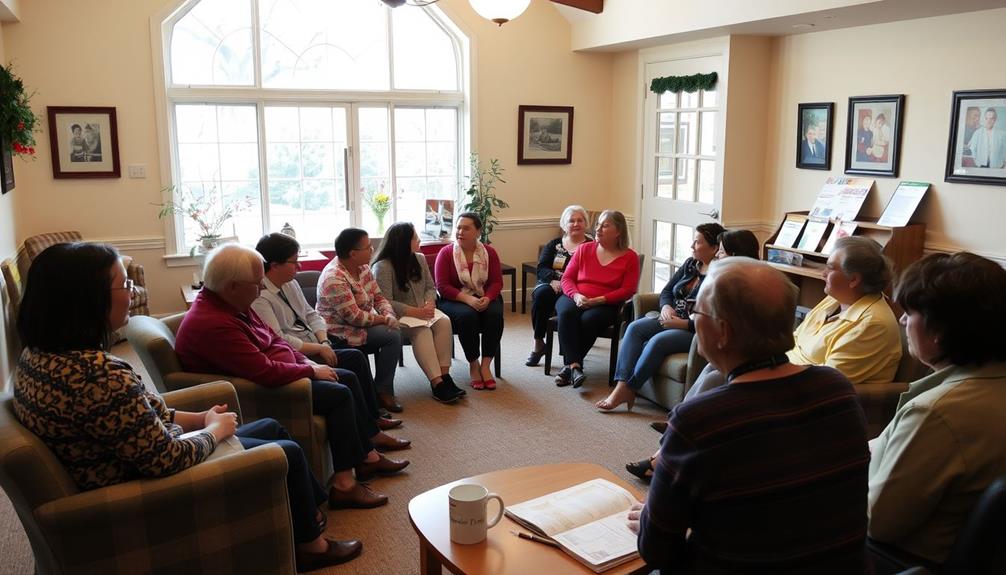
Finding local support resources for dementia and Parkinson's care can feel overwhelming, but it doesn't have to be. You can find valuable help by tapping into various community options. Start by consulting your neurologist or physician; they often have recommendations for local support groups tailored to your needs.
Additionally, consider setting a budget for any potential costs associated with support services, as managing finances is essential in navigating care options budgeting for expenses.
Here are some other ways to find support:
- Community hospitals: Many offer outreach services and maintain listings of available support groups for individuals and caregivers.
- National organizations: Groups like the Parkinson's Foundation maintain online directories, helping you locate specialized support in your area.
- Local newspapers: Check community calendars for announcements of support group meetings, which can help you stay informed.
When exploring these resources, consider your personal preferences. Different formats—whether in-person, online, or specialty groups—cater to various comfort levels and needs.
Connecting with people living through similar experiences can make a world of difference. Don't hesitate to reach out; finding the right support can greatly enhance your journey.
Online Support Group Options

Exploring online support group options can complement the local resources you've discovered. These online support groups provide access to a global community, enabling you to connect with others facing similar challenges related to dementia and Parkinson's disease. Platforms like HealthUnlocked, NeuroTalk, and dedicated Facebook groups create forums for sharing experiences, coping strategies, and emotional support tailored to your needs.
The rise of AI-driven platforms has also enhanced the experience of online engagement, offering personalized recommendations for support groups based on individual preferences.
One significant advantage of online support groups is their asynchronous communication, allowing you to engage at your convenience. This flexibility enhances accessibility, especially if you have varying schedules or commitments. Research shows that participation in these groups can lead to improved mental health outcomes, fostering a greater sense of social connectedness.
Additionally, many online resources include expert-led discussions and workshops, offering valuable information on symptoms, treatments, and caregiving strategies. By joining these online communities, you can gain insights and support that mightn't be available locally.
Embracing these options can enrich your journey, providing a sense of belonging and understanding as you navigate the complexities of dementia or Parkinson's disease.
Starting Your Own Support Group
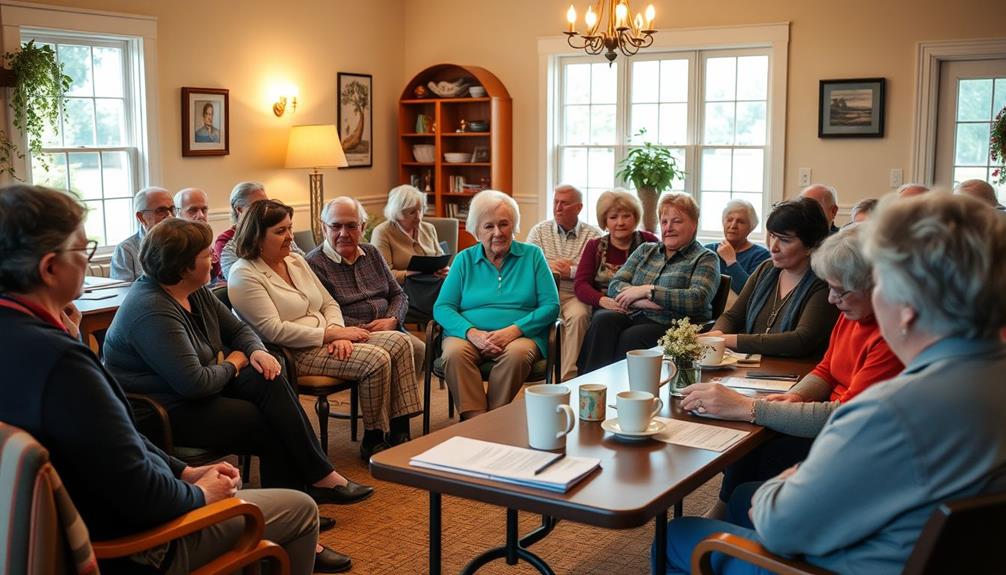
Starting a support group can be a rewarding way to connect with others who understand the challenges of dementia or Parkinson's disease. To kick things off, you need to clearly define your target audience. Focus on individuals with Parkinson's or their care partners to guarantee your group remains relevant.
Reflect on incorporating essential items for emergencies that can provide comfort during tough times, as these practical skills can be beneficial for both caregivers and patients alike.
Here are some essential steps to reflect on:
- Choose a suitable location: Prioritize privacy, as personal discussions require a safe and confidential environment.
- Set a meeting frequency: Decide whether you want to meet monthly or bi-weekly, establishing a consistent schedule that encourages regular attendance.
- Promote your group: Use community outreach through flyers, online platforms, and local services to attract members and raise awareness about the support available.
Incorporating diverse meeting formats, like guest speakers or facilitated discussions, can enhance engagement and provide valuable insights.
Overcoming Challenges in Support Systems
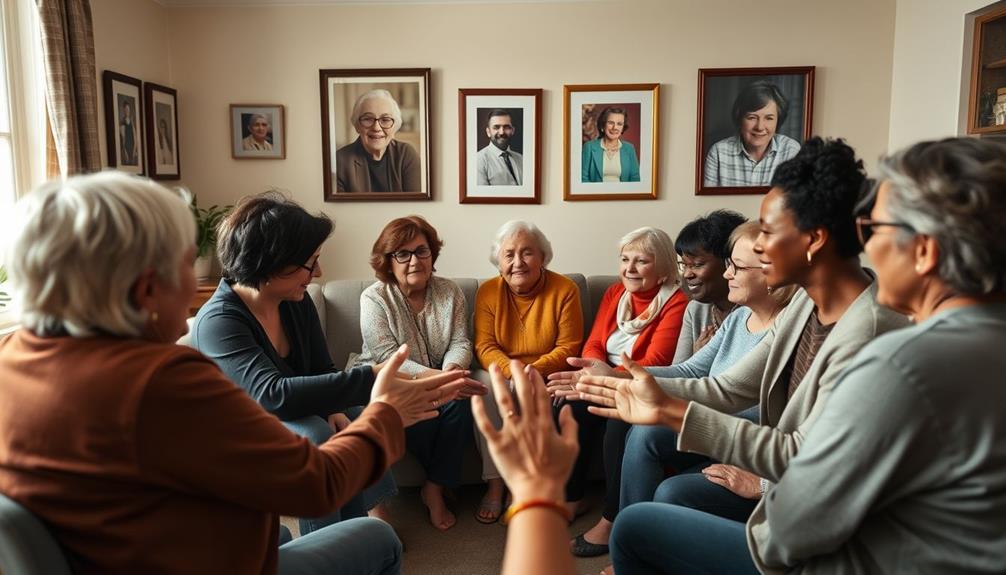
Overcoming challenges in support systems for dementia and Parkinson's care is crucial for guaranteeing effective management and improved patient outcomes.
You may notice that poor communication often hampers collaboration between care professionals and family members. Without clear channels of communication, care can become fragmented, leaving patients without the thorough support they need.
A mixed-methods study highlighted that increased workloads and overstretched services push patients toward alternative support systems. This often means treatments, like physiotherapy, aren't communicated to relevant healthcare providers.
To address this, integrated communication systems are essential for enhancing patient management.
Moreover, family caregivers frequently find themselves excluded from care planning. Early involvement of family members can greatly improve outcomes for individuals with dementia and Parkinson's, as their insights are invaluable.
Policymakers need to take action by establishing formal structures for multisectoral collaboration in managing these conditions.
Emphasizing community resources will guarantee that disadvantaged populations receive the support they require.
Frequently Asked Questions
What Are the Benefits of Support Groups for Parkinson's Disease?
Support groups for Parkinson's disease help you connect with others facing similar challenges. You'll share experiences, gain valuable coping strategies, and reduce feelings of isolation, ultimately enhancing your emotional well-being and quality of life.
What Is the Best Support Group for Parkinson's Disease?
Finding the right support group for Parkinson's can feel like searching for a lighthouse in a storm. You'll want to explore local options, online communities, and specialized groups to discover what resonates with you best.
What Are the Benefits of Support Groups for Dementia Patients?
Support groups for dementia patients help you share experiences and learn coping strategies. You'll find emotional support, reduce isolation, and gain knowledge about caregiving, which empowers you to manage challenges more effectively and confidently.
What Is the 1 Year Rule for Parkinson's Dementia?
The "1 Year Rule" suggests that after significant motor symptoms of Parkinson's, cognitive decline usually starts about a year later. It's essential you monitor changes closely for timely interventions and support.
Conclusion
In the journey through dementia and Parkinson's, support groups act like lighthouses in a foggy sea, guiding both caregivers and patients toward hope and understanding. By connecting with others, you weave a tapestry of shared experiences, lightening the load and enriching your path. Whether you find solace in local gatherings or online communities, remember: you're never truly alone. As you navigate these waters, let the strength of support be your anchor, helping you weather every storm together.
